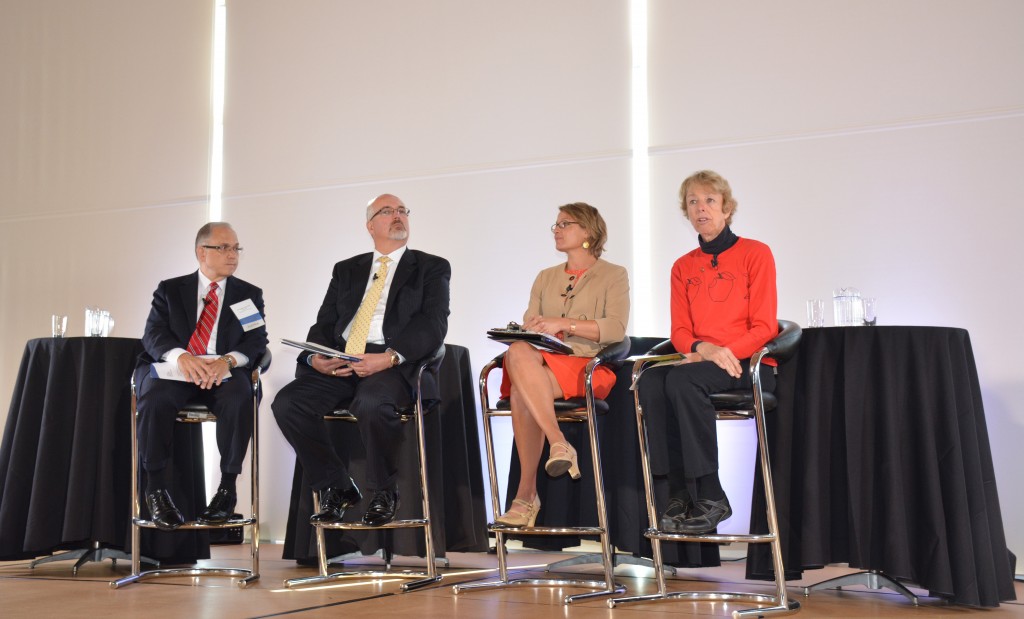Sustainability continues to be a hot topic in today’s world and there are countless reasons why a business would benefit from becoming more sustainable. Benefits range from the opportunity to save money and reduce waste to improved relationships with constituents. The advantages are impressive, but what does it actually take for a business to begin down a path towards sustainability?
This concept was explored today at the New Jersey Sustainability and Small Business Summit, which was held in The Duncan Family Sky Room. The event was sponsored by Verizon, with support from Saint Peter’s University, the City of Jersey City, the New Jersey Technology Council and NJ.com. Nearly 200 small business owners, community leaders and members of the Saint Peter’s University community gathered to hear from representatives from New Jersey’s public, private, non-profit and academic sectors.
Individuals from leading organizations joined forces for a series of panel discussions designed to educate small business owners on how to make sustainability a part of their business strategy in order to ultimately reduce costs and increase profits.
 Eugene J. Cornacchia, Ph.D., president of Saint Peter’s University, served as a moderator for the first panel, which was titled, “The Art of Sustainability.” The panel focused on how small businesses can save money and increase profits while reducing their impact on the environment. The panel included Pam Mount, owner of Terhune Orchards; Joseph Prusik, manager of asset management renewables at PSE&G; and Jamie Ewalt Gray, from the assistant commissioner’s office of water resource management for the N.J. Department of Environment.
Eugene J. Cornacchia, Ph.D., president of Saint Peter’s University, served as a moderator for the first panel, which was titled, “The Art of Sustainability.” The panel focused on how small businesses can save money and increase profits while reducing their impact on the environment. The panel included Pam Mount, owner of Terhune Orchards; Joseph Prusik, manager of asset management renewables at PSE&G; and Jamie Ewalt Gray, from the assistant commissioner’s office of water resource management for the N.J. Department of Environment.
“We are extremely pleased to host a conference on sustainability because Saint Peter’s is a leader in this category in many ways,” said Dr. Cornacchia. “As a Jesuit, Catholic institution, we strongly believe in being a good steward of God’s creation, and we have sought cutting-edge science to assist in the goal of reducing the carbon footprint of the University.”
The University has maintained a commitment to sustainable energy. In 2011 the University entered a $6.3 million energy services contract, which involved the installation of solar arrays above a number of buildings on the campus to generate electricity and a cogeneration plant that produces both low carbon heat and electricity. Another component of the contract was the Green Energy Command Center, which contains software and equipment that tracks the amount and type of energy being used on campus. The Center also serves as an educational tool for students.
In 2013, the University opened the Mac Mahon Student Center, which is soon to be a certified LEED-Silver building. Previous green projects at Saint Peter’s include the implementation of 100 percent renewable energy generated by wind power as the sole source of purchased electricity and in 2008 Dr. Cornacchia, joined more than 650 others in signing the American College and University Presidents’ Climate Commitment (ACUPCC). The commitment acknowledges that the University will continue to be an early adopter of environmentally friendly solutions. Organizations such as Students Against Violating the Earth (SAVE) also exist on campus in order to engage students in sustainability efforts.
The two additional panel discussions were titled, “Tools to go Green,” and “Colloquy: A Leadership Perspective on Sustainability in Small Business.”
The “Tools to go Green” panel included Adam Zellner, president of Greener by Design; Chris Bollwage, mayor of Elizabeth, N.J.; Paul VanGelder, vice president for power and energy market development, CHA Inc.; and Ed Kurocka, program manager for N.J. Small Business Development Center. This panel explored how business owners can identify available resources and utilize sustainable technologies to achieve sustainability goals.
The “Colloquy: A Leadership Perspective on Sustainability in Small Business” panel included Randall Soloman, co-founder of Sustainable Jersey and senior advisor for The College of New Jersey; James Gowen, chief sustainability officer and vice president of supply chain operations for Verizon; Tom Bracken, president of the New Jersey Chamber of Commerce; and Jeana Wirtenberg, co-founder and senior advisor for the Institute for Sustainable Enterprise.
Guests of the event also had the opportunity to hear from Vivian Brady-Phillips, deputy mayor of Jersey City, who shared the latest updates on the sustainability front for the City of Jersey City. Jersey City is currently engaged in a number of sustainability efforts ranging from training city employees on green construction to the plans for a new park, which is expected to be the city’s largest.
